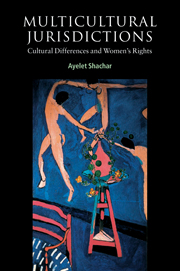Book contents
- Frontmatter
- Contents
- Preface
- 1 Introduction
- 2 The perils of multicultural accommodation
- 3 Family law and the construction of collective identity
- 4 State vs. nomos: lessons from contemporary law and normative theory
- 5 Sharing the pieces of jurisdictional authority: mapping the possibilities
- 6 Transformative accommodation: utilizing external protections to reduce internal restrictions
- 7 Conclusion
- Appendix: How transformative accommodation works in different social arenas
- References
- Index
3 - Family law and the construction of collective identity
Published online by Cambridge University Press: 22 September 2009
- Frontmatter
- Contents
- Preface
- 1 Introduction
- 2 The perils of multicultural accommodation
- 3 Family law and the construction of collective identity
- 4 State vs. nomos: lessons from contemporary law and normative theory
- 5 Sharing the pieces of jurisdictional authority: mapping the possibilities
- 6 Transformative accommodation: utilizing external protections to reduce internal restrictions
- 7 Conclusion
- Appendix: How transformative accommodation works in different social arenas
- References
- Index
Summary
No solution to the paradox of multicultural vulnerability can be found unless we have a clearer understanding of where the paradox hits hardest, and family law provides an excellent test case for just such a study. Clearly, when the state awards jurisdictional powers to the group in the family law arena, it enhances the group's autonomy. At the same time, this re-allocation of legal authority from the state to the group may also expose certain individuals within the group to systemic and sanctioned in-group rights violations. This manifestation of the multiculturalism paradox in the family law arena does not cause a problem for the strong version of multiculturalism, since the strong version is primarily concerned with strengthening the nomoi group, even at the expense of imposing disproportionate costs upon individuals inside it. But it does raise a serious dilemma for the weak version of multiculturalism.
The dilemma is this. There are good reasons to support accommodation in the family law arena, especially in the case of non-territorial nomoi communities that demarcate membership boundaries through personal status and lineage rules. Prime among the reasons offered for supporting accommodation is the fact that in many of these groups the rules encompassed in their system of family law fulfil a task similar to that of citizenship law for a state. A nomoi group's membership rules, encoded in family law, thus provide the bonds which connect the past to the future, by identifying who is considered part of the tradition.
- Type
- Chapter
- Information
- Multicultural JurisdictionsCultural Differences and Women's Rights, pp. 45 - 62Publisher: Cambridge University PressPrint publication year: 2001

